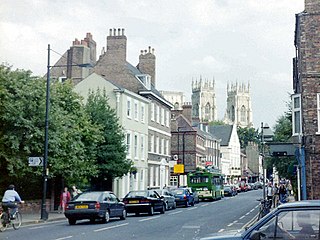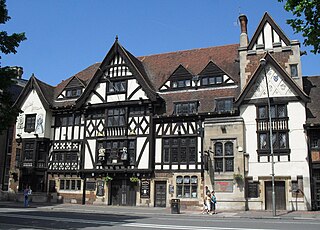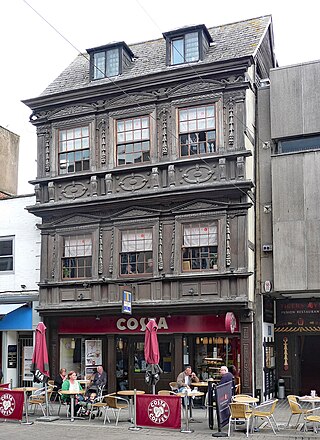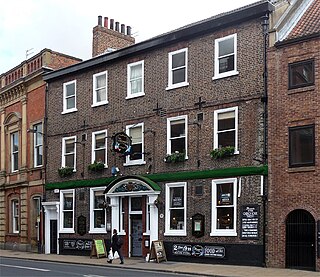
Bootham is a street in the city of York, England, leading north out of the city centre. It is also the name of the small district surrounding the street.

York has, since Roman times, been defended by walls of one form or another. To this day, substantial portions of the walls remain, and York has more miles of intact wall than any other city in England. They are known variously as York City Walls, the Bar Walls and the Roman walls. The walls are generally 13 feet (4m) high and 6 feet (1.8m) wide. They are the longest town walls in England.

The Brisbane Showgrounds is a multi-purpose venue located in Bowen Hills, Brisbane. Established in 1875, it hosts more than 250 events each year, the largest being the Royal Queensland Show (Ekka).

The Miller Tavern is a restaurant located in a historic building at 3885 Yonge Street in Toronto, Ontario, south of York Mills Road in the York Mills neighbourhood. Originally called the York Mills Hotel and later named the Jolly Miller, the building dates from the 1850s.

The Monroe Avenue Commercial Buildings, also known as the Monroe Block, is a historic district located along a block-and-a-half stretch at 16-118 Monroe Avenue in Detroit, Michigan, just off Woodward Avenue at the northern end of Campus Martius. The district was designated a Michigan State Historic Site in 1974 and listed on the National Register of Historic Places in 1975. The thirteen original buildings were built between 1852 and 1911 and ranged from two to five stories in height. The National Theatre, built in 1911, was the oldest surviving theatre in Detroit, a part of the city's original theatre district of the late 19th century, and the sole surviving structure from the original Monroe Avenue Commercial Buildings historic period.

The King and Queen is a pub in the seaside resort of Brighton, part of the city of Brighton and Hove. The present building, a "striking" architectural "pantomime" by the prolific local firm Clayton & Black, dates from the 1930s, but a pub of this name has stood on the site since 1860—making it one of the first developments beyond the boundaries of the ancient village. This 18th-century pub was, in turn, converted from a former farmhouse. Built using materials characteristic of 16th-century Vernacular architecture, the pub is in the Mock Tudor style and has a wide range of extravagant decorative features inside and outside—contrasting with the simple design of the neighbouring offices at 20–22 Marlborough Place, designed a year later. English Heritage has listed the pub at Grade II for its architectural and historical importance.

The Orient Hotel is a heritage-listed hotel at 560 Queen Street, Brisbane CBD, City of Brisbane, Queensland, Australia, on the corner of Ann Street. It was originally built as the Excelsior Hotel in 1875 and extended in 1884, both of which were designed by Brisbane architect Richard Gailey. It was added to the Queensland Heritage Register on 23 April 1999.

The Royal Hotel is a Grade II listed building and was a former hotel located in the English city of Norwich in the county of Norfolk. The hotel closed its doors in 1977 and is now used as a business centre.

Ulster Hotel is a heritage-listed hotel at 25 Brisbane Street, Ipswich, City of Ipswich, Queensland, Australia. It was built in 1910. It was added to the Queensland Heritage Register on 21 October 1992.

The Royal Oak is a Grade II-listed house in Frindsbury, a Medway town in Kent, United Kingdom. The building dates from the late 17th century and it was used as a public house since before 1754. It is one of a few pre-Victorian buildings on Cooling Road in Frindsbury and one of the last remaining coach houses in the area.

9 and 9A Southgate Street is a 17th-century Jacobean timber-framed merchant's house on Southgate Street, Gloucester. It has been a Grade I listed building since 23 January 1952. 9 Southgate Street is now occupied by Costa Coffee and 9A Southgate Street is occupied by The Tiger's Eye restaurant.

Palisade Hotel is a heritage-listed pub and hotel located at 35–37 Bettington Street, in the inner city Sydney suburb of Millers Point of New South Wales, Australia, adjacent to Barangaroo Reserve. Administratively, the hotel is in the City of Sydney local government area. It was designed by H. D. Walsh and built in 1915–16. It is privately owned. It was added to the New South Wales State Heritage Register on 2 April 1999.

The Captain Cook Hotel is a heritage-listed pub located at 33–35 Kent Street, in the inner city Sydney suburb of Millers Point, Australia. It was added to the New South Wales State Heritage Register on 2 April 1999.

The Lord Nelson Hotel is a heritage-listed pub and hotel located at 19 Kent Street, Millers Point, Sydney, New South Wales, Australia. It was built by James Dempsey around 1814 to 1815. James Dempsey was originally a stonemason born in Ireland. It is the oldest working licensed hotel in Sydney. It was added to the New South Wales State Heritage Register on 2 April 1999.

The Sussex Hotel is a heritage-listed hotel at 20 Sussex Street, Sydney, New South Wales, Australia. It was built from 1913 to 1915. Historically known as the New Hunter River Hotel, it was known as the Big House Hotel from 1973 until 1991, then as Napoleon's Hotel, Moreton's on Sussex and Moreton's Hotel before adopting its current name. It was added to the New South Wales State Heritage Register on 2 April 1999.

Lawrence Street is a road in York, in England, immediately south-east of the city centre.

The Red Lion is a pub in the city centre of York, in England.

The Museum Street Tavern, formerly Thomas's of York, is a historic pub in the city centre of York, in England.

Ye Olde White Harte is a public house in Hull, England. It was built around 1660 in the Artisan Mannerist style but did not become a pub until the 1730s. In the aftermath of the Glorious Revolution of 1688 it was the site of a successful plot to remove the Catholic Governor of Hull. The pub was remodelled in 1881 in the Romantic style with extensive alteration to the interior and façade. At least two residents have suffered fatal accidents in the pub and it is reputed to be "one of Hull's most haunted".

The Churchill Hotel is a historic building on Bootham, north of the city centre of York in England.




















